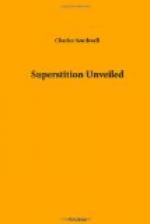The millions of Christian people who have been trained up in the way they should not go, by this active class of fanatics, are naturally either opposed to reason or impervious to it. They are convinced not only that the wisdom of the world is foolishness with God, but that wisdom with God is foolishness with the world; nor will any one affirm their ‘moderation’ in respect to unbelievers one tittle more moderate than Bishop Hall’s; or that they are one tittle less disposed than ’that good and great man,’ to think those who bring heretics to the stake at Geneva or elsewhere, ‘do well approve themselves to God’s Church.’ Educated, that is to say duped as they are, they cannot but think disbelief highly criminal, and when practicable, or convenient, deal with it as such.
It is, nevertheless, true, that Universalists have been helped to some of their best arguments by adversaries. Bishop Watson, to wit, has suggested objections to belief in the Christian’s Deity, which they who hold no such belief consider unanswerable. In his famous ‘Apology’ he desired to know what Paine thought ’of an uncaused cause of everything, and a Being who has no relation to time, not being older to day than he was yesterday, nor younger to day than he will be to-morrow—who has no relation to space, not being a part here and a part there, or a whole anywhere? of an omniscient Being who cannot know the future actions of man, or if his omniscience enables him to know them, of the contingency of human actions? of the distinction between vice and virtue, crime and innocence, sin and duty? of the infinite goodness of a Being who existed through eternity without any emanation of his goodness manifested in the creation of sensitive beings? or, if it be contended that there was an eternal creation, of an effect coeval with its cause, of matter not posterior to its maker? of the existence of evil, moral and natural, in the work of an Infinite Being, powerful, wise, and good? finally, of the gift of freedom of will, when the abuse of freedom becomes the cause of general misery?’ [15:1]
These questions imply much. That they flowed from the pen of a Bishop, is one of many extraordinary facts which have grown out of theological controversy. They are questions strongly suggestive of another. Is it possible to have experience of, or even to imagine, a Being with attributes so strange, anomalous, and contradictory? It is plain that Bishop Watson was convinced ‘no man by searching can find out God.’ The case is, that he, in the hope of converting Deists, ventured to insinuate arguments highly favourable to Atheism, whose professors consider an admission of utter ignorance of God, tantamount to a denial of His existence. Many Christians, with more candour, perhaps, than prudence, have avowed the same opinion. Minutius Felix, for example, said to the Heathen, ’Not one of you reflects that you ought to know your Gods before you worship them.’ [15:2] As if he felt the absurdity of pretending to love and honour an unknown ‘Perhaps.’ That he did himself what he ridiculed in them proves nothing but his own inconsistency.




